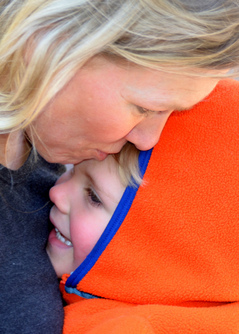I have only met each of them once. But once was all I needed. Just as there are ways of knowing rapidly that a professional is not someone you want working with you/your child (lack of qualifications and lack of empathy probably being the biggest), there are some hard and fast ways of knowing when you've found the perfect service providers. Here are the ones that convinced me:
- Seeing and adapting to the person in front of them
As soon as these therapists saw a need for sensory stimulation, they incorporated the needed stimulation into what they were doing. They provided (requested) deep pressure while working on articulation, incorporated wheel barrow walking into naming flash cards. They also used the time table that worked for their client. By which I mean, if he was having trouble focusing, they didn’t look at the clock and say, oh dear I still have three more goals to work on today. (Or if they did, they did a great job of masking it.) They adapted the activity, and the time table, to fit him. They weren’t just checking the boxes and going through the motions of what a therapist should do, but actually focusing on doing the things that the client needed.
- Open to Listening and Learning
I was concerned when I saw a therapist (gently) grab the client’s face to force eye contact. My face showed it and I started to say something and cut myself off. The therapist could tell something wrong and encouraged me to talk about my concerns. And when I told her, you know what she did? She listened. Instead of immediately brushing my words off, she let them seep in, and even asked questions about what I told her. As I poured out to her how invasive that can feel, how Autistic adults have spoken out against that, how even requests for eye contact can actually lead to a whole new set of problems (eye contact and staring are easily confused), and the compromise that Caley does instead of eye contact (she looks at people’s mouths, chins, eye brows, or noses instead of actually looking into their eyes – it satisfies our cultural standards while not being uncomfortable), she listened attentively and said she’d change what she did with the client as a result. And THEN she said that she was open to learning even more. It was an awesome moment.
- Making accommodations
When I saw the visual schedule, I was excited. When a therapist actually asked me what transition techniques worked best for the client, I was in love.
- Caring
If you get the vibe that the client is just another appointment in the long day until 5 PM comes and the therapist can go home, you’ve got the wrong therapist. No matter what time of day we met with them, these therapists brought the same amount of compassion and caring to the table. It’s obvious that they’re in it for the clients, not just a pay check.
- Applications to daily life
One of the therapists said to me, look, /l/ sounds are all well and good but what we need to focus on most is what will have the most impact on the client’s daily life. And then she gave me tips, not just on how to do speech homework off of a worksheet, but how to incorporate working on speech in every day contexts. Have I mentioned I’m in love?
I am so very excited. And relieved. As a future therapist myself, I had been very disappointed by the sort of therapists I had seen. 'Is this what my field looks like?' I'd asked myself. I am so very happy to be able to report that is not the case. I pray that the rest of you also find therapists such as these, and even if you don't have one right now, please know that they're out there. Don't lose hope, because they really and truly do exist. I hope this list of characteristics will help you find them.
And if not, here's a list of clinicians that other parents and autistic people have found helpful. The main US list is the last post on this page (keep scrolling until you see it), http://www.wrongplanet.net/postxf66842-0-45.html
- but there are providers from other countries (I saw some from NZ, Australia, Canada, and the UK, but there may be more) interspersed throughout the rest of the thread. I actually consulted the list to find a therapist in my area to shadow and when I did, I found he was every bit as awesome as he'd been presented as. I hope you all also have luck with it!
-Creigh

 RSS Feed
RSS Feed
